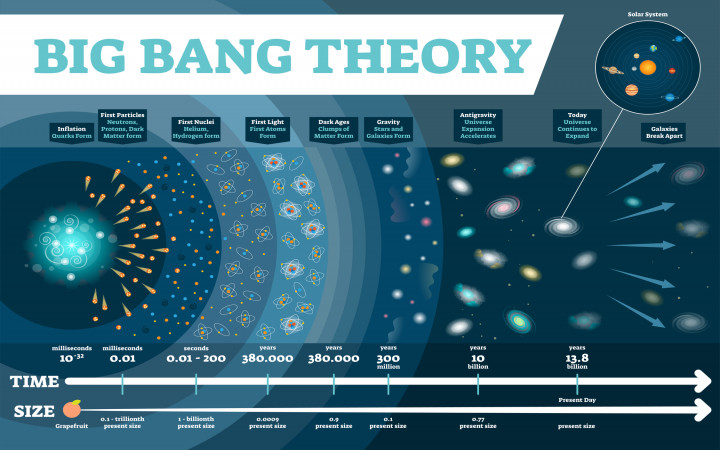Today’s Wonder of the Day was inspired by Audrey. Audrey Wonders, “What is the Big Bang Theory?” Thanks for WONDERing with us, Audrey!
Our world is full of interesting questions. What happened to the dinosaurs? Are ghosts real? What about aliens? In Wonderopolis, we love making new discoveries. We want to learn something new about the world every day.
However, there are a lot of questions that don’t have answers yet. What is dark matter? Can anything live inside a black hole? What caused the Big Bang? Some people are frustrated by questions that don’t have answers. However, we think it’s fun to learn about all the possible answers to a question. We can look at the evidence ourselves to decide what we believe.
Have you ever heard of the Big Bang theory? It’s a scientific explanation of the history of our universe. Based on the name, you might expect that it starts with an explosion. However, that’s not the case. Instead, the Big Bang starts with an expansion.
According to the Big Bang theory, our universe was once smaller than an atom. All the matter in the universe was held in a tiny point with a huge mass. This point is called a singularity. Around 13.8 billion years ago, that tiny point began to expand quickly. It grew, and it grew, and it kept growing.
As the universe grows, it’s also cooling. Just after the Big Bang, the universe was so hot that light wasn’t possible. Can you imagine that? There was no light anywhere. Slowly, as matter cooled, the first stars formed, giving off light. Other matter formed into planets, comets, asteroids, and everything else in our universe.
Based on the evidence they’ve gathered, many experts think the Big Bang was the beginning of time. If that’s true, then what caused the Big Bang? The short answer is, we don’t know. And we likely won’t know for a long time. However, scientists have many ideas.
Some experts believe the Big Bang was more of a big bounce. This would mean that our universe is one in a series of universes. In the big bounce, our expanding universe keeps growing until it stops. At some point, it begins to shrink. Growing smaller and smaller, the universe returns to the point of singularity. There, it bounces. The Big Bang begins again, with a new universe expanding as ours once did.
Other experts believe that the Big Bang wasn’t the beginning of time. Instead, they think there could be other universes growing all around us. Some scientists believe universes are constantly bumping into each other and setting off Big Bangs. This would cause a limitless number of other universes that exist in a multiverse.
Scientists David Sloan, Julian Barbour, Tim Koslowski, and Flavio Mercati think there could be a mirror universe to our own. They called it the flipped universe. In that universe, time flows in the opposite direction of our own. It would exist on the other side of the point of singularity.
Stephen Hawking also thought there could be more than one universe. In his final paper, he said that our universe could be a projection of a two-dimensional universe. If this is true, the other universe would have caused the Big Bang.
Some people don’t believe in the Big Bang at all. Many religions instead believe that an all-powerful god created the world. In fact, a 2014 AP poll found that 51% of Americans were either unsure about the Big Bang or didn’t believe it ever happened. Clearly, there are many questions about the beginning of our universe left to answer.
We may never know what caused the Big Bang. What do you think? Was the Big Bang caused by another universe? Was it a big bounce? Do you have your own idea? We’re sure it‘s out of this world!
Standards: NGSS.ESSA1.1, NGSS.PS1.A, CCRA.L.3, CCRA.L.6, CCRA.R.1, CCRA.R.2, CCRA.R.10, CCRA.W.2, CCRA.W.4, CCRA.W.7, CCRA.W.8, CCRA.W.9, CCRA.L.1, CCRA.L.2, CCRA.SL.1, CCRA.SL.2




